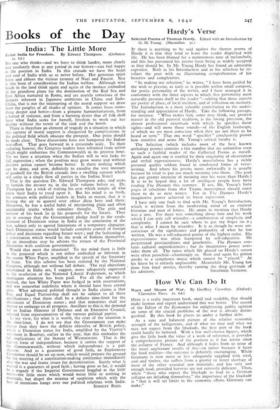Books of the Day
India: The Little More
Enlist India for Freedom. By Edward Thompson. (Gollancz. 2S. 6d.)
No one who thinks—and we have to think harder, more clearly and resolutely than at any period in our history—can feel happy at the position in India. In this crusade we have the heart and soul of India with us as never before. Her generous spirit hates and abhors the vicious tyranny of Nazi and Fascist. Nor is this born of consideration for Indian welfare. Although wise heads in the land think again and again of the menace embodied in the grandiose plans for the domination of the Red Sea and East Africa nurtured in Rome, and are acutely conscious of the dangers inherent in Japanese ambitions in China and Indo- China, that is not the mainspring of the moral support we draw from the peoples of all shades of opinion. It comes from some- thing deeper and better—from a genuine humanitarianism, from a hatred of violence, and from a burning desire that all folk shall have what India seeks for herself, freedom to work out her destiny without the terror of the tank and the bomb.
There is therefore an element of tragedy in a situation in which this current of moral support is chequered by complications in
the political field which obscure the prospect. One point should be made clear. These discussions have not hampered the Indian war-effort. That goes forward in a crescendo scale. To their enduring honour, the Congress leaders have refrained from action which might embarrass the Commonwealth in its greatest hour. Yet we have a situation when the Indian will to win lacks its full expression ; when the position may grow worse and without decisive action cannot 'become better. Is there nothing which can be done, and now, definitely to canalise the vast measure of goodwill for the British crusade into a swelling current which will unite in a single flow all parties in the Indian State?
That is the question Dr. Edward Thompson asks, and seeks to furnish the answer to, in the little volume before us. Dr. Thompson has a trick of trailing his coat which tempts all who know their India to tread upon it. But his mind is so fresh, his contacts with political leaders in India so recent, that it is beating the air to quarrel over obiter dicta here and there. Moreover, he has a useful habit of interjecting plain and often unpalatable .truths which stimulate thought. The pith and marrow of his book lie in his proposals for the future. They are in essence that the Government pledge itself to the estab- lishment of Dominion status in India at the conclusion of the war, subject only to agreed limitations of a temporary character. Such Dominion status would include complete control of foreign policy and decisions regarding future wars ; and the fashioning of a constitution which would be the work of Indians themselves. As an immediate step he advises the return of the Provincial Ministries with coalition governments. Would that meet the situation? To my mind there is little in the proposal which is not either embodied or inherent in the recent White Paper, amplified in the speech of the Secretary of State. Yet this scheme has been rejected by the National Congress, although not without full debate. The real objections entertained in India are, I suggest, more adequately expressed in the resolution of the National Liberal Federation, to which inadequate attention has been paid. For all the advance it marked, the last White Paper was hedged in with reservations, and was somewhat indefinite where it should have been crystal clear. What advanced political thought in India claims is that Free and Equal Partnership shall not be subject to all these qualifications ; that there shall be a definite time-limit for the attainment of Dominion status ; and that minorities shall not impose an embargo on all progress. Ancillary to this is the demand for an Indian Minister of Defence and an Executive Council, selected from representatives of the various political parties. In my view, for what it is worth, the crux of the situation is the time-limit I do not see that the Government can make clearer than they have the definite objective of British policy, which is Dominion status for India, amplified by the Viceroy's statement in Bombay, earlier in the year, that this embodies the full implications of the Statute of Westminster. That is the highest form of independence, because it carries the support of the Commonwealth, without which independence is a pale shadow. And as a guarantee of good faith, an Exploratory Committee should be set up now, which would prepare the ground for the meeting of a constitution-making conference immediately after the war and frame issues for determination. Surely what is wanted is a guarantee of good faith ; having gone so far, it would be a tragedy if the Imperial Government boggled at the little more—the little more which would mean little or nothing in essentials, but dispel the miasma of suspicion which with the best of intentions hangs over our political relations with India.
STANLEY REED.


























 Previous page
Previous page